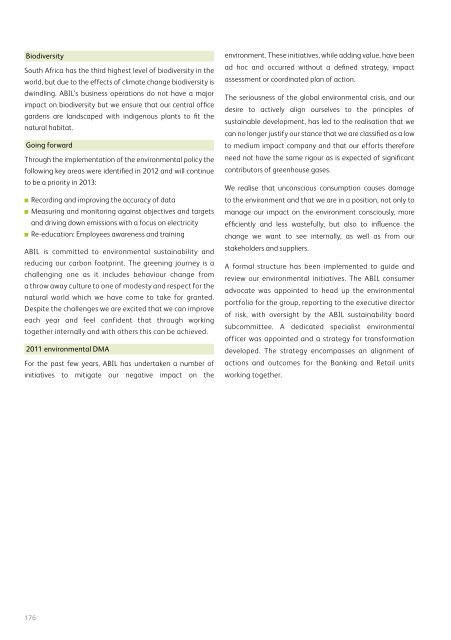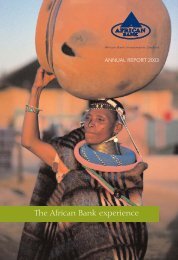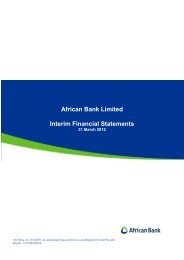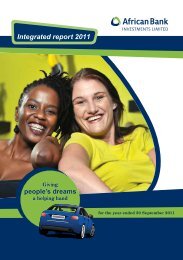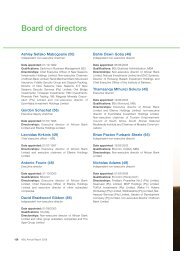- Page 1 and 2:
Responsible credit with passion, co
- Page 3 and 4:
ABIL group - shareholders, funders,
- Page 5 and 6:
Contents Group profi le 2 Operating
- Page 7 and 8:
Operating structure >ABIL in perspe
- Page 9 and 10:
Our values We pledge to live by the
- Page 11 and 12:
‘03 ABIL achieves investment grad
- Page 13 and 14:
African Bank Investments Limited Fi
- Page 15 and 16:
African Bank Investments Limited Fi
- Page 17 and 18:
Shareholders’ profile Top fund ma
- Page 19 and 20:
2007 2006 2005 2004 2003 >ABIL in p
- Page 21 and 22:
2007 2006 2005 2004 2003 >ABIL in p
- Page 23 and 24:
Robert John (Johnny) Symmonds (53)
- Page 25 and 26:
Mojankunyane Florence (Mojanku) Gum
- Page 27 and 28:
Contents Letter to stakeholders 24
- Page 29 and 30:
Incwadi eya kubabambiqhaza Isingeni
- Page 31 and 32:
Ulwazi oluhambelanayo lungatholakal
- Page 33 and 34:
Umhlaba oncintisanayo Ukukhula okuk
- Page 35 and 36:
labele izidingongqangi ezikhulayo e
- Page 37 and 38:
Ukuze uthole olunye ulwazi ngemizam
- Page 39 and 40:
ngo-1994. Wenze ukufaka isandla oku
- Page 41 and 42:
usiness overview Material issue Why
- Page 43 and 44:
For more information on people rela
- Page 45 and 46:
egistered some short term gains and
- Page 47 and 48:
What sets us apart Quality of our p
- Page 49 and 50:
Active engagement with our people i
- Page 51 and 52:
Our customers Engagement methods St
- Page 53 and 54:
ABIL engaged with a wide group of l
- Page 55 and 56:
The most important of these are dis
- Page 57 and 58:
The risk base of the group is not c
- Page 59 and 60:
Return on equity in line with targe
- Page 61 and 62:
Retail unit Consolidation adjustmen
- Page 63 and 64:
Retail unit Consolidation adjustmen
- Page 65 and 66:
Share based payment reserve Other O
- Page 67 and 68:
Financial returns >business overvie
- Page 69 and 70:
Gross profit margin % 46 44 42 41 3
- Page 71 and 72:
were launched in October. The virtu
- Page 73 and 74:
Number of employees - Banking unit
- Page 75 and 76:
Of the credit cards issued in 2012,
- Page 77 and 78:
Disbursement features Disbursements
- Page 79 and 80:
Vintage graph - African Bank (More
- Page 81 and 82:
Liabilities Funding >business overv
- Page 83 and 84:
Capital management >business overvi
- Page 85 and 86:
The changes to capital adequacy on
- Page 87 and 88:
Contents Corporate governance repor
- Page 89 and 90:
Corporate governance structure Grou
- Page 91 and 92:
Board meetings and attendance >acco
- Page 93 and 94:
Conflict of interest All directors
- Page 95 and 96:
The office of the group compliance
- Page 97 and 98:
Introduction and report objectives
- Page 99 and 100:
■ Ensuring that there is an adequ
- Page 101 and 102:
Component Summary Benefits Benefits
- Page 103 and 104:
Exposure to existing long term ince
- Page 105 and 106:
The components of executive directo
- Page 107 and 108:
LTIPs awarded to executive director
- Page 109 and 110:
accountability the annual general m
- Page 111 and 112:
Risk management objectives >account
- Page 113 and 114:
Three levels of defence as applied
- Page 115 and 116:
Case volumes received: Year-on-year
- Page 117 and 118:
For more detail, see the group’s
- Page 119 and 120:
accountability Risk Mitigation Furt
- Page 121 and 122:
accountability Risk Mitigation Furt
- Page 123 and 124:
expectation that losses will occur
- Page 125 and 126:
Refer to page 74 and 76 in the inte
- Page 127 and 128:
ABIL - capital adequacy ratio % 25
- Page 129 and 130: Liquidity and funding The group man
- Page 131 and 132: deposits at highly competitive rate
- Page 133 and 134: Regulatory risk South Africa’s cu
- Page 135 and 136: Regulatory issue Description Risk/I
- Page 137 and 138: Regulatory issue Description Risk/I
- Page 139 and 140: Dear Sir/Madam In the year 2009 I e
- Page 141 and 142: Scorecard information* Target score
- Page 143 and 144: GRI SO1 For a detailed report on CS
- Page 145 and 146: accountability Overall employee tur
- Page 147 and 148: The Banking unit has increased the
- Page 149 and 150: accountability Transformation and e
- Page 151 and 152: Union membership 2012 47,8% 52,0% 0
- Page 153 and 154: Employee turnover % 45 40 35 30 25
- Page 155 and 156: Union membership % 70 60 50 40 30 2
- Page 157 and 158: Transformation and employment equit
- Page 159 and 160: ■ C = Collect; ■ A = Advise;
- Page 161 and 162: GRI PR7 GRI PR8 GRI PR9 Customer ex
- Page 163 and 164: GRI PR1, PR2 >accountability condit
- Page 165 and 166: GRI EC8, EC9, S01 >accountability l
- Page 167 and 168: Number of projects 9% 5% ■ KwaZul
- Page 169 and 170: Ilembe schools connectivity project
- Page 171 and 172: For more information on CSI visit h
- Page 173 and 174: accountability and measured against
- Page 175 and 176: GRI EN18 Weaknesses and shortfalls
- Page 177 and 178: GRI EN2 >accountability Paper savin
- Page 179: GRI EN30 Community engagement >acco
- Page 183 and 184: est practice) gasses are absent and
- Page 185 and 186: Findings Based on our review of the
- Page 187 and 188: Description Explanation 2.7 Markets
- Page 189 and 190: Description Explanation 4.8 Interna
- Page 191 and 192: Description Explanation EC4 Signifi
- Page 193 and 194: Description Explanation Emissions,
- Page 195 and 196: Description Explanation Occupationa
- Page 197 and 198: Description Explanation Freedom of
- Page 199 and 200: Description Explanation Customer he
- Page 201 and 202: Annual financial statements 197-320
- Page 203 and 204: 45.1 Operating segments 285 45.2 Se
- Page 205 and 206: Dividend cover (times) Dividend cov
- Page 207 and 208: Acronyms and abbreviations ABIL Afr
- Page 209 and 210: Nine-year summarised group income s
- Page 211 and 212: Currency adjusted group income stat
- Page 213 and 214: Directors’ responsibility stateme
- Page 215 and 216: Audit committee report The audit co
- Page 217 and 218: Domestic Medium Term Note (DMTN) Pr
- Page 219 and 220: Interest of directors of the compan
- Page 221 and 222: ■ Granting the general approval t
- Page 223 and 224: Group income statement for the year
- Page 225 and 226: Share based payment reserve Cash fl
- Page 227 and 228: Notes to the group annual financial
- Page 229 and 230: IFRS/IFRIC Title and details Expect
- Page 231 and 232:
IFRS/IFRIC Title and details Expect
- Page 233 and 234:
3. Critical accounting judgements a
- Page 235 and 236:
3.2.2 Impairment of advances >annua
- Page 237 and 238:
annual financial statements practic
- Page 239 and 240:
Business combinations >annual finan
- Page 241 and 242:
annual financial statements payment
- Page 243 and 244:
4.10.3 Subsequent measurement >annu
- Page 245 and 246:
annual financial statements A finan
- Page 247 and 248:
annual financial statements Bank or
- Page 249 and 250:
annual financial statements For the
- Page 251 and 252:
annual financial statements Ordinar
- Page 253 and 254:
4.20 Cost of sales 4.19.3.4 Deliver
- Page 255 and 256:
annual financial statements The sha
- Page 257 and 258:
annual financial statements the exp
- Page 259 and 260:
annual financial statements R milli
- Page 261 and 262:
9. Net advances continued 9.1 Credi
- Page 263 and 264:
9. Net advances continued 9.1 Credi
- Page 265 and 266:
R million Opening balance Recognise
- Page 267 and 268:
R million Carrying value at the beg
- Page 269 and 270:
R million Balance at the beginning
- Page 271 and 272:
annual financial statements R milli
- Page 273 and 274:
2012 2011 Unamortised discount Net
- Page 275 and 276:
2012 2011 Unamortised discount Net
- Page 277 and 278:
Foreign currency translation Foreig
- Page 279 and 280:
Interest capitalised 2012 2011 Unam
- Page 281 and 282:
annual financial statements 2012 20
- Page 283 and 284:
annual financial statements R milli
- Page 285 and 286:
annual financial statements R milli
- Page 287 and 288:
annual financial statements 2012 20
- Page 289 and 290:
annual financial statements R milli
- Page 291 and 292:
annual financial statements 46. Fin
- Page 293 and 294:
R million Up to 1 month Greater tha
- Page 295 and 296:
annual financial statements 46. Fin
- Page 297 and 298:
annual financial statements 46. Fin
- Page 299 and 300:
annual financial statements Index t
- Page 301 and 302:
R million Carrying value at year en
- Page 303 and 304:
annual financial statements 49. Int
- Page 305 and 306:
annual financial statements 50. Lon
- Page 307 and 308:
51. Analysis of financial assets an
- Page 309 and 310:
annual financial statements 51. Ana
- Page 311 and 312:
annual financial statements 55. Ret
- Page 313 and 314:
annual financial statements 58. Res
- Page 315 and 316:
Company statement of comprehensive
- Page 317 and 318:
Notes to the company annual financi
- Page 319 and 320:
annual financial statements R milli
- Page 321 and 322:
annual financial statements R milli
- Page 323 and 324:
Prefsure (Botswana) Limited Insuran
- Page 325 and 326:
Contents Shareholder information Di
- Page 327 and 328:
Dividend timetable >shareholder inf
- Page 329 and 330:
JSE statistics >shareholder informa
- Page 331 and 332:
Analysis of ordinary shareholders a
- Page 333 and 334:
Contents Annual general meeting Not
- Page 335 and 336:
3. Ordinary resolution 3 - Election
- Page 337 and 338:
annual general meeting As the revis
- Page 339 and 340:
annual general meeting 9.1 immediat
- Page 341 and 342:
annual general meeting 11.3.3 repur
- Page 343 and 344:
Motivation for ordinary resolution
- Page 345 and 346:
annual general meeting message util
- Page 347 and 348:
Leonidas (Leon) Kirkinis Chief exec
- Page 349 and 350:
higher. Qualifying participants are
- Page 351 and 352:
(iv) Directors’ interests in secu
- Page 353 and 354:
Application form: Electronic partic
- Page 355 and 356:
Form of proxy African Bank Investme
- Page 357 and 358:
annual general meeting Summary of s
- Page 359 and 360:
Corporate information Board of dire


